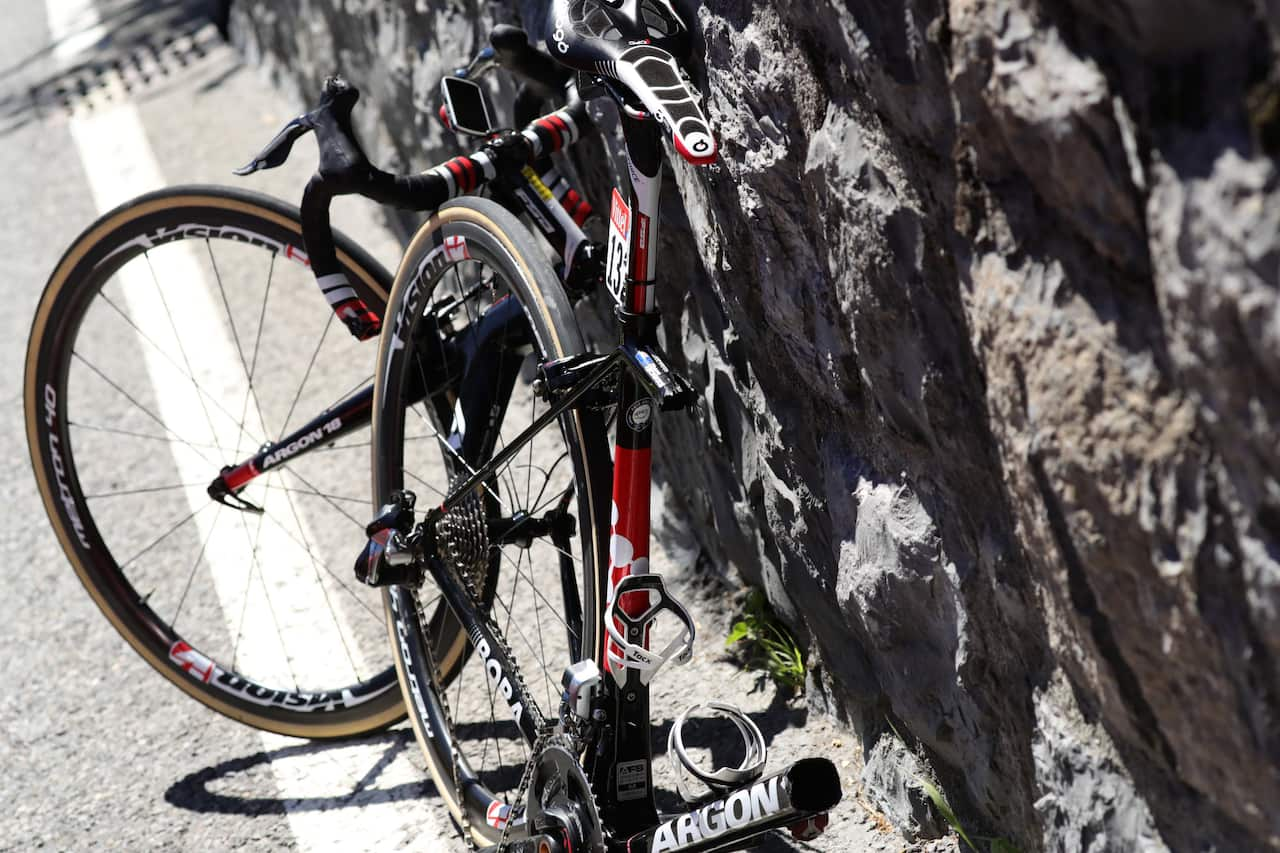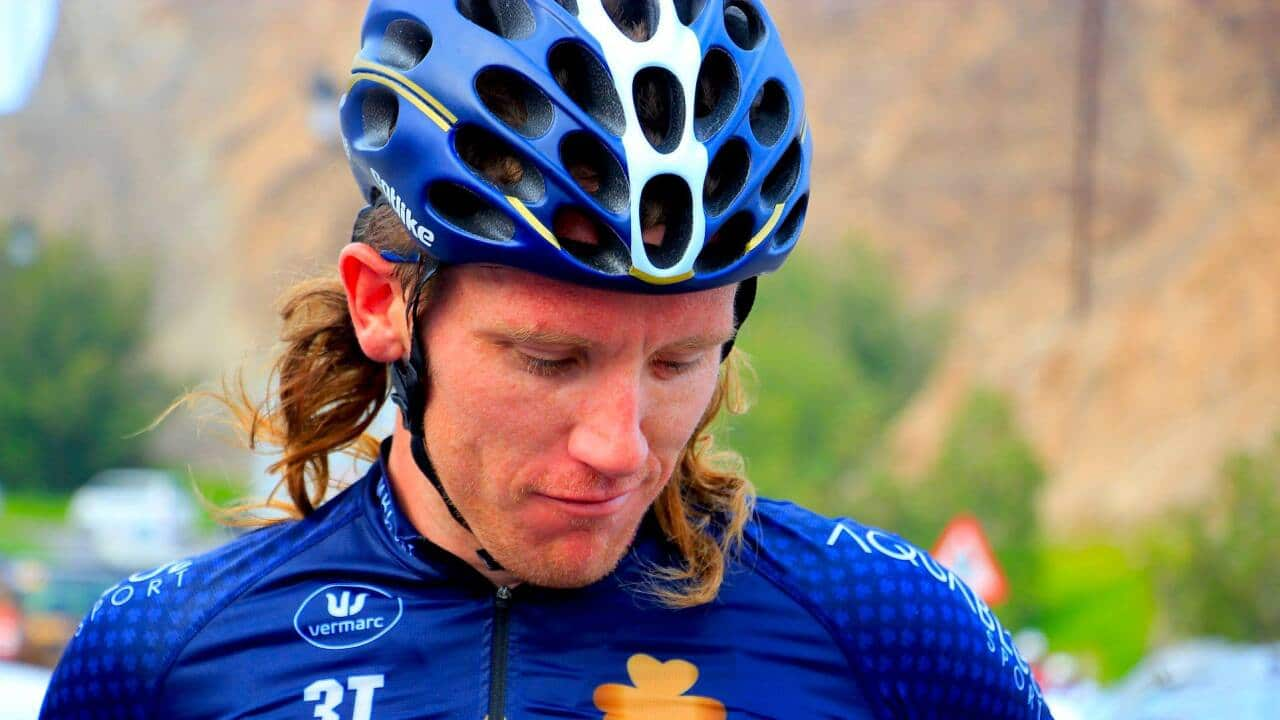The Aqua Blue Sport lead-out specialist is even more sternly driven in the aftermath of the documented high-speed smash at the 2016 edition, which took 15-months to properly return from.
He suffered a fractured pelvis in the stage 17 crash, the impact of which broke his bike and indirectly led to an agonising back injury that required surgery. In that collective time, prolonged by medical diagnosis and misdiagnosis, the 29-year-old was also edged out of BORA-hansgrohe and an established partnership with Irish sprinter Sam Bennett, who he hopes to reunite with in the future.
In that collective time, prolonged by medical diagnosis and misdiagnosis, the 29-year-old was also edged out of BORA-hansgrohe and an established partnership with Irish sprinter Sam Bennett, who he hopes to reunite with in the future.

Shane Archbold's broken bike after his crash on stage 17 of the 2016 Tour de France (Getty) Source: Getty
Archbold sacrificed a track campaign at the Rio Olympics to make his debut at the Tour where the problems stemmed.
He could be easily pardoned for being blatantly pissed by the whole tale but instead has become more professional in his approach to the sport, and now focused on getting something back for his diligence.
“In cycling, you sacrifice a lot for other people, if that’s what your job is, which I’m more than happy to do but you’ve got to get some personal joy out of it,” he told Cycling Central at the Tour of Oman.
“I’ve spent a lot of time laying on my back. People know nerve pain is not a pretty pain, it’s not a broken bone or a lot of skin missing, it’s something completely different to any of that. It’s just made me want to get something more out of cycling as well as doing my job.
“I’m definitely not angry, just hungry. I’m not frustrated. It all started from a crash where I was completely on my own with no-one else to blame.”
Archbold grew up in Timaru, New Zealand with no childhood desire to become a pro cyclist.
“For every little kid in New Zealand, you want to be an All Black,” he says. “A travelling lifestyle with sport is similar.”
The former Olympic, World and Commonwealth track racer was introduced to the sport through a high school caretaker, eventually sacrificing rugby and wrestling for two wheels.
“I never planned to be a professional cyclist in Europe. I just took it one year at a time with the track, it turned into a professional road contract and now it’s my life,” he says.
“It’s really good to be back racing properly after way too many months off.”
Archbold is now based in and has a life in Girona, Spain, with his girlfriend, who doesn’t mind his trademark and moniker mullet, the result of a 2006 bet with two older cyclists for a “reasonable sum of money” that he only ever got partly paid for.
“After London 2012, I shaved it off and grew it back just out of laziness. The 2016 Tour was in the pipeline but not getting to Paris put a backburner on that, so I need a new goal. For the moment, it’s there to stay,” he says.
Archbold has started a new cycling chapter with the second-tier Aqua Blue Sport, which he joins on a single-year deal this season.
He is set to work almost exclusively with British sprinter Adam Blythe while managing his own sporadic opportunities including a mad dash with a very tight turnaround to represent New Zealand at the Commonwealth Games in Queensland.
“We’re Pro Continental so we don’t have a huge lead-out train, we don’t have, I guess, the respect of the peloton so it’s starting all of that again, like me and Sam had the first years at Bora when we were Pro Continental,” Archbold says.
“But there’s not any really big differences, my job stays the same, it’s just a matter of the sprinter behind me. It’s good.”
Archbold piloted Blythe for the first time at the Tour of Oman last week where he also tested his own mettle, finishing the fourth stage, which Magnus Cort Nielsen (Astana) won, in a hardy second group following three ascents of the strenuous Al Jabal Street climb.
“[It] was a decent opportunity for me, it wasn’t spoken about but I knew I had a chance if I felt good. The climb was a little bit too long and the split in the groups made it hard. I was in the right group, it just split in two and then I was behind the right group, but it shows that I cared,” he says.
Speaking at a race hotel in Muscat, Archbold cuts a tough but honest and affable figure.
He still has, as happened in Oman, reservations about racing downhill, which is understandable given he crashed on a descent in excess of 80km/h at the Tour.
"The lead-outs I’m comfortable doing, just going downhill I’m a bit hesitant. I’m not real confident at high speed but it’s just if you’ve got time to think about it, it’s an issue,” Archbold says.
He may not live in New Zealand anymore, but it lives in him as the stereotypical ‘she’ll be right’ attitude he has applied to mental wounds and recovery indicates.
“It’s nothing that won’t come back over time, I just need to race a bit more,” he continues.
On the back of so much challenge and change, Archbold doesn’t have any firm, personal targets for 2018 save for representing his country again at the Commonwealth Games.
“I don’t really plan too much in advance. I don’t even really have short-term goals for this season, just to get through and be stronger at the end of it,” he says.
“I definitely do want to win a professional race sometime soon. It’s something I’ve never really concentrated on. I was always more happy helping the team but now that I’ve got that period of injury, you’ve got to get something out of it for yourself.
“It’s definitely a goal to try and win something; what that is yet I haven’t worked out but we’ll get there.”
Archbold says he wasn’t medically concussed from the Tour crash but doesn’t remember it, only the aftermath talking to team staff. It made life hell, but may actually in a twisted way now help him arrive.
“It’s taught me to definitely be more professional in my approach to training and racing just because I have to be, I don’t want to relapse with injury so it’s more a precautionary thing,” he says.
“But cycling is still not a job for me, it’s a sport at the end of the day. I wouldn’t do it as a job that’s for sure; I couldn’t put myself through this much pain for work.”
Share
Watch the FIFA World Cup 2026™, Tour de France, Tour de France Femmes, Giro d’Italia, Vuelta a España, Dakar Rally, World Athletics / ISU Championships (and more) via SBS On Demand – your free live streaming and catch-up service. Read more about Sport
Have a story or comment? Contact Us

